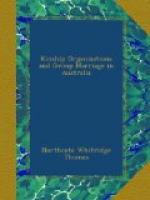On the other hand, unless the totems have been scattered through the phratries since the southern Arunta divided their classes, Dr Durkheim will have difficulty in explaining why a tribe where the totem does not concern marriage at all has found it necessary to split the classes; and that though the child does not take its totem from mother or father.
Herr Cunow has advanced the view that the classes correspond to distinctions of age; but he took as his basis, not the differentia of elder and younger, but the distinction made by the initiation customs, which divide the community, in his view, into three strata—young, adult and old. Into the difficulties created by this theory we need not here enter. Suffice it to say that the theory depends on the supposition that an age-grade had to marry within itself. Now the age-grade is not a fixed body, but is continually changing its personnel; not only so, but it is difficult to see how marriage could take place, given the initiation ceremonies, in any other way; unions of “old men” with adult women apart, which are not, in fact, prohibited, so far as is known, the only marriages possible are those within the adult grade. Although father and son can rarely belong to the adult grade simultaneously, mother and daughter can readily do so. If not, these grades are clearly generation classes, and what Herr Cunow really takes as the basis of his theory is the generation in each family. This can readily be shown by a consideration of the kinship terms.
FOOTNOTES:
[130] Roth, Eth. Stud. p. 182; Spencer and Gillen, Nor. Tr. p. 616; Howitt, p. 262; J.R.S.N.S.W. XXXI, 166.
[131] J.A.I. VII, 249, cf. J.R.S.N.S.W. XXXI, 172.
[132] Howitt, p. 110.
[133] Nor. Tr. p. 167; Proc. R.G.S. Qu. XVI, 70; J.R.S.N.S.W. XXX, 111, 112.
[134] Ann. Soc. VIII, 118.
[135] Spencer and Gillen, Nor. Tr. p. 166.
[136] Nor. Tr. p. 163.
[137] p. 142.
CHAPTER IX.
KINSHIP TERMS.
Descriptive and classificatory systems. Kinship
terms of Wathi-Wathi,
Ngerikudi-speaking people
and Arunta. Essential features. Urabunna.
Dieri. Distinction
of elder and younger.
Some classless two-phratry tribes observe in practice the same rules as the four and eight class tribes when they are deciding what marriages are permissible. The Dieri and Narrangga follow the eight-class rule; the position of the Urabunna is somewhat uncertain owing to the obscurity of our authorities, which again is probably due to their lack of intimate acquaintance with the tribe; and the Wolgal, Ngarrego and Murring have the simple four-class rule that a man marries his mother’s brother’s daughter.




